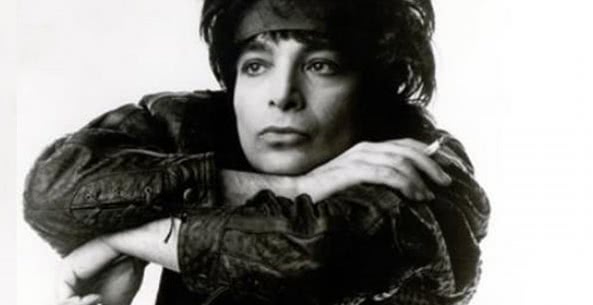Alan Vega was a man out of time.
Though his style combined the swaggery, sexualised sensitivity of Elvis Presley with the leering nastiness of New York’s protopunk scene, he never sounded like anybody but himself. The concept of trendsetters in music is an overdone one –a lot of so-called ‘unique’ musicians sound like a pack of established names – but Vega was a one-two punch in a world of handshakes, a genre-defying innovator who laid the groundwork for the entire punk movement with a single album, Suicide.
Yet though that record might be his best known, in truth Vega’s solo work is similarly studded with hits, gems both well-received and undervalued. In light of the man’s sad passing, here are seven serves of his genius.
–
7. ‘Jukebox Babe’ – Alan Vega
Vega spent his career experimenting with rockabilly the way a cat paws a mouse, pushing the genre to its very limit with suspicious, unerring intent. ‘Jukebox Babe’ is perhaps the best example of his proclivity for a distinctly American brand of surrealism, and the song’s looping, jangly hook has a two-pots-of-coffee anxiety about it that Vega near-trademarked.
–
6. ‘Fireball’ – Alan Vega
Like James Brown on meth, ‘Fireball’ trades in the control of ’50s rock’n’soul singers with a skin-prickling sense of abandon. Vega was a master of repetition – he was punk rock’s Philip Glass – and the unpleasantly jaunty jolt of ‘Fireball’ finds grim satisfaction in a terrifying reluctance to try anything new. It’s a bad dream of a song, the same progression over and over: a glass dropped from a ten-storey building that never hits the ground.
–
5. ‘American Dreamer’ – Alan Vega and Ric Ocasek
Though The Cars’ Ric Ocasek might seem like the last person in the world with whom Vega would collaborate, in truth the duo enjoyed a years-long working relationship, one that saw Ocasek producing a number of Vega’s solo records. ‘American Dreamer’, a song co-written by the pair, combines the best of those two distinct worlds, marrying Ocasek’s pop-hungry ear with Vega’s more disruptive tendencies. The result is a mewling, rabid bastard child that invites both dancing and distaste.
–
4. ‘Fear’ – Alan Vega and Marc Hurtado
Sniper, Vega’s final record, saw the musician taking Suicide’s grimy beats to their natural conclusion and fully embracing the electronica he had spent years flirting with. That album’s finest moment, ‘Fear’, is as manic as any song Vega ever recorded – a dance track for the depraved that embraces every itchy, glitchy opportunity electronic music provides.
–
3. ‘Fat City’ – Alan Vega, Alex Chilton and Ben Vaughn
Another unlikely meeting of minds which resulted in another singularly revolutionary record. It was an impromptu jam session between Vega, Big Star’s Chilton and outsider artist Vaughn that birthed Cubist Blues, a jazz lick-load worth of stylised madness. “I showed up with lyrics for one song and figured we would see what happened,” Vega wrote in the liner notes for the record’s reissue. “Little did I know, we would record for hours and hours. By the last song, my brain was burning up. I literally felt myself on fire. I was depleted. Yet, we could have gone on and on.”
–
2. ‘Love Cry’ – Alan Vega
Identifying any single track as Vega’s darkest is risky business – even the man’s most upbeat singles reek of a distinctly wretched hopelessness. And yet ‘Love Cry’, a hunk of jade that weighs down his debut album’s second half, soars murkily to a new place entirely, marrying the structure of a ballad with Vega’s insidious howl. It’s leery, it’s letchy, and it’s luscious – a love song breathed into life by a killer.
–
1. ‘Viet Viet’ – Alan Vega
Clocking in at almost 13 minutes, ‘Viet Viet’ is one of Vega’s longest songs, a thrashing, blood-soaked epic that transforms into a sonic endurance test around the eight-minute mark. Vega rambles, screeches and screams his way through the tune, chewing up the song’s edges and spitting out the chorus with a singular disgust. Seemingly impervious to the years, ‘Viet Viet’ feels as vital today as when it was first released: a hex, borne through time untouched.
And yet despite its viciousness, there’s a strange warmth to the tune too. It’s a relatable evil, a horror with its arms stretched wide – the sound of a singer inviting his audience to watch the world burn to the ground with him. That, after all, was Vega’s genius: he made the end of the universe seem like something to be shared.
Any masterpieces we missed? Leave ’em down in the comment section below.


































